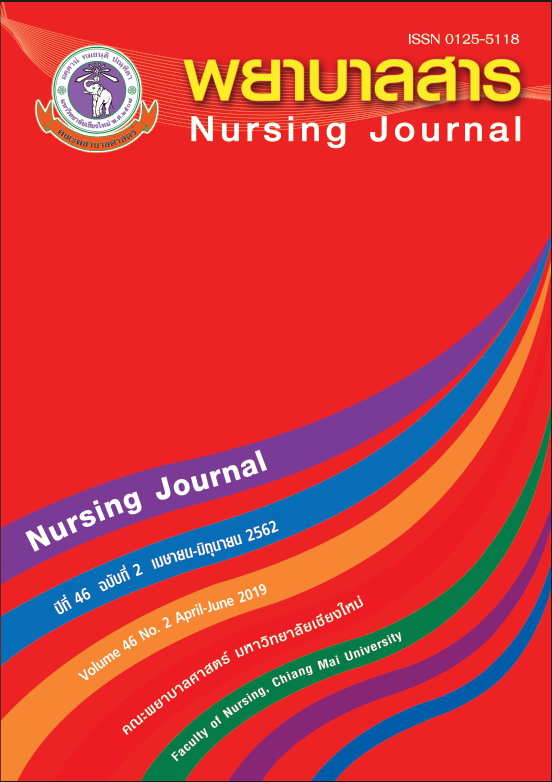Predicting Factors of Uncertainty in Illness among Persons with Colorectal Cancer
Keywords:
Uncertainty in Illness, Social support, Stage of the disease, Colorectal cancer, Predicting FactorsAbstract
Colorectal cancer is a major cause of morbidity in many countries. Similar to other cancers, uncertainty always exists among persons in illness situations including ambiguous, complex, and unpredictable. This predictive correlative research aimed to identify predicting factors of uncertainty in illness among persons with colorectal cancer. The study sample consisted of 100 persons with colorectal cancer who received treatment at a provincial hospital in southern Thailand. Social support and stage of disease were selected as the predicting factors. The stage of disease based on phases of treatment was reviewed from patient records. Data relating to social support were collected using the Personal Resource Questionnaire (PRQ 85–Part II) and uncertainty in illness data were collected using the Mishel’s Uncertainty in Illness Scale (MUIS). Data from these questionnaires were collected by air mailing. Predictive relationships between social support, stage of disease, and uncertainty in illness were analyzed using Logistic Regression analysis.
The findings from this study revealed that 75 % of the study sample had uncertainty in illness at moderate level and 16 % at high level. Social support and stage of disease accounted for 81% of predictors of overall uncertainty in illness. Social support and stage of disease accounted for 92 % of predictors of moderate level uncertainty in illness and 75 % of high level uncertainty in illness.
The findings of this study demonstrate the significance of social support and stage of disease based on phases of treatment as the predictors of uncertainty in illness among persons with colorectal cancer. The findings can be used to guide clinical practice in terms of seeking appropriate ways to decrease uncertainty in illness. The experimental research is recommended for further study in order to identify nursing interventions.
References
30(5), 277-280.
Cancer in Thailand. (2006). Volume IV, 1998-2000. Retrieved from http://jjco.oxfordjournals. org/cgi/content/abstract/38/4/237
Cancer in Thailand. (2010). Volume V, 2001-2003. Retrieved from http://www.nci.go.th/File_ download/ Nci%20Cancer%20Registry/ Book%20Cancer%20In%20 Thailand% 202010% 20for%20Web.pdf
Cancer in Thailand. (2012). Volume VI, 2004-2006. Retrieved from http://www.nci. go.th/th/ File_ download/Nci%20Cancer%20Registry/Cancer% 20in%20thailand.pdf
Cotrim, H., & Pereira, G. (2008). Impact of colorectal cancer on patient and family: implications for care. European Journal of Oncology Nursing, 12, 217-226. doi:10.1016/j.ejon. 2007.11.005
Deane, K. A. & Degner, L. F. (1998). Information need, uncertainty, and anxiety in women who had a breast biopsy with beginning outcome. Cancer Nurse, 21(2), 117-126. Retrieved from http://www.ncbi.nlm.nih.gov/pubmed/9556938
Jemal, A., Bray, F., Center, M. M., Ferlay, J., Ward, E., & Forman, D. (2011). Global Cancer Statistics. CA CANCER J CLIN, 61(2), 69–90. doi:10.3322/caac.20107
Galloway, S. C., & Graydon, J. E. (1996). Uncertainty, symptom distress, and information need
after surgery for cancer of the colon. Cancer Nursing, 19(2), 112-117.
Graves, K.D. (2003).Social cognitive theory and cancer patients’ quality of life: a meta-analysis of psychosocial intervention components. Health Psychology, 22(2), 210-219.
Hongtrakul, C.(1991).Rel ationships among selected basic conditioning factors social support
and self-care agency in essential hypertensive patients. Graduate school ,Mahidol
University.(In Thai)
Kaveevivitchai, C.(1993). Relationship among selected factors, uncertainly in illness, social
support and adaptation in Breast Cancer Women receiving chemotherapy. Graduate
school,Mahidol University.(In Thai)
Karsa, L.V., Lignini, T.A., Patnick, J., Lambert, R., & Sauvaget, C. (2010). The dimensions of the CRC problem. Best Practice & Research Clinical Gastroenterology, 24, 381-396.
Kim, S.H., Lee, R., & Lee, K.S. (2011). Symptoms and uncertainty in breast cancer survivors in
Korea: differences by treatment trajectory. Journal of Clinical Nursing, 21, 1014–
1023: doi: 10.1111/j.1365-2702.2011.03896.x
Liao, A. N., Chen, M. F., Chen, S. C., & Chen, P. L. (2008). Uncertainty and anxiety during the
diagnostic period for women with suspected breast cancer. Cancer Nursing, 31(4),
274-283. Retrieved from http://www.ncbi.nlm.nih.gov/pubmed/18600114
Liu, L. N., Li, C.Y., Tang, S. T., Huang, C. S., & Chiu, A.F. (2006). Role of continuing supportive cares in increasing social support and reducing perceived uncertainty among women with newly diagnosed breast cancer in Taiwan. Cancer Nursing, 29(4), 273-282. Retrieved from http://www.ncbi.nlm.nih.gov/pubmed/16871094
Mishel, M. H. (1988). Uncertainty in illness. Image: The Journal of Nursing Scholarship, 20(4),
225-232.
National Cancer Institute.(2012).Hospital-Based Cancer Registry 2011 Volume 27. Retrieved
fromhttp://www.nci.go.th/th/File_download/Nci% 20Cancer%20Registry/Hospitalbase
2011.pdf.(In Thai)
National Cancer Institute.(2013).National Cancer Control Programmes ( 2013 – 2017).Bangkok
:Printing Agriculture Cooperative of Thailand. (In Thai)
O’Connor, A.P., Wicker, C.A., & Germino, B. B. (1990). Understanding the cancer patient’s search for meaning. Cancer Nursing, 13(3), 167-175. Retrieved from http://www. ncbi.nlm. nih.gov/pubmed/2354429.
Pochanart, A., Tipaporn, W., & Achara, S.,(2013).Effect of Supportive - Educative Nursing System on Uncertainty inIllness among Newly Diagnosed Breast Cancer Patients.Nursing Journal40(3),75-85.(In Thai)
Polit, D. F., & Hungler, B P. (1999). Nursing Research: Principles and methods. (6th ed.).
Philadelphia: Lippincott.
Somchit Hancharoenkun, Boonchan Wongsunpharat and Tipaporn Wonghongkul. (1991).
Factor In uencing Uncertainty in Illness among Children with Cancer Receiving
Chemotherapy.Nursing Journal40(1),11-26.(In Thai)
Shaha, M., & Cox, C. L. (2003). The omnipresence of cancer. European Journal of Oncology
Nursing, 7(3), 191-196.
Shaha, M., Cox, C. L., Talman, K., & Kelly, D. (2008). Uncertainty in breast, prostate, and colorectal cancer: implications for supportive care. Journal of Nursing Scholarship, 40(1), 60-67. doi: 10.1111/j.1547-5069.2007.00207
Taylor, C. (2001). Patients’ experiences of ‘feeling on their own’ following a diagnosis of colorectal cancer: a phenomenological approach. International Journal of Nursing Studies, 38, 651-661. Retrieved fromhttp://www.sciencedirect.com/ science/article/ pii/ S0020748900001097
Taylor,C., Richardson, A., & Cowley, S. (2010). Restoringe mbodied control following surgical treatment for colorectal cancer: A longitudinal qualitative study. International Journal of Nursing Studies, 47(8), 946-56. doi:10.1016/j.ijnurstu.2009.12.008
Tseng, H., Wang, H., Hsu, Y., & Weng, W. (2004). Stress in patients with colostomies.
Kaohsiung Journal of Medical Science, 20(2), 70-76.
Worster, B., & Holmes, S. (2008). The preoperative experience of patients undergoing surgery for colorectal cancer: A phenomenological study. European Journal of Oncology Nursing, 12, 418–424. doi: 10.1016/j.ejon.2008.05.007
Downloads
Published
How to Cite
Issue
Section
License
บทความที่ได้รับการตีพิมพ์เป็นลิขสิทธิ์ของวารสารพยาบาลสาร
ข้อความที่ปรากฏในบทความแต่ละเรื่องในวารสารวิชาการเล่มนี้เป็นความคิดเห็นส่วนตัวของผู้เขียนแต่ละท่านไม่เกี่ยวข้องกับมหาวิทยาลัยเชียงใหม่ และคณาจารย์ท่านอื่นๆในมหาวิทยาลัยฯ แต่อย่างใด ความรับผิดชอบองค์ประกอบทั้งหมดของบทความแต่ละเรื่องเป็นของผู้เขียนแต่ละท่าน หากมีความผิดพลาดใด ๆ ผู้เขียนแต่ละท่านจะรับผิดชอบบทความของตนเองแต่ผู้เดียว






